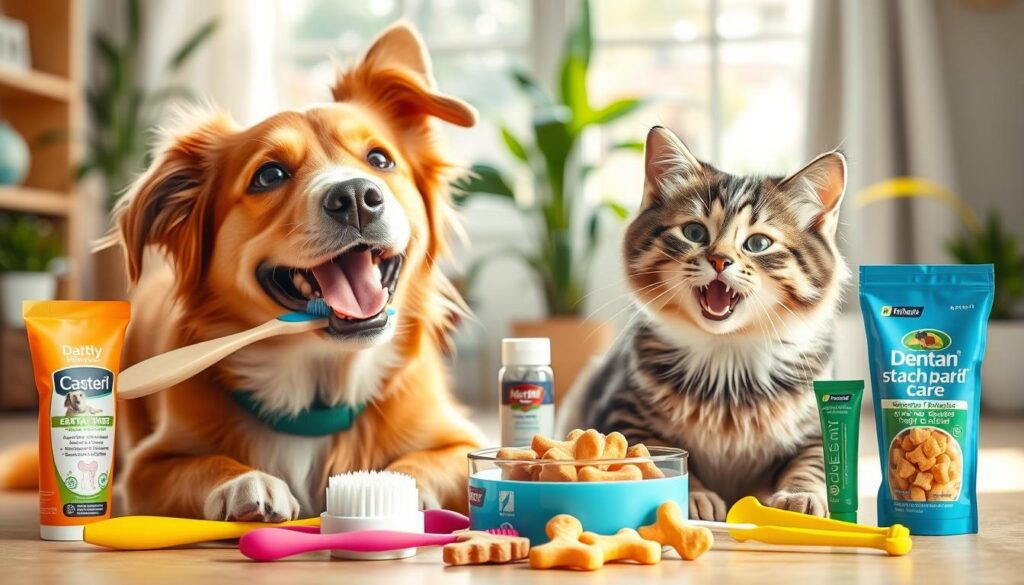As a pet owner, your main goal is to make sure your furry friend is happy and healthy. Pets are more than animals; they are part of the family. To keep them well, it’s important to focus on their health.
But have you ever thought about what are the essential pet health tips that can make a big difference in your pet’s well-being?
This article will share important pet health tips from vet experts. We’ll cover topics like regular check-ups, the right food, exercise, dental care, and more. By following these tips, you can help your pet stay healthy and happy.
Key Takeaways
- Regular vet visits are key for early detection and care.
- Proper nutrition supports your pet’s health, based on their age, size, and breed.
- Exercise keeps your pet at a healthy weight and prevents health problems.
- Dental care, like brushing and professional cleanings, can add years to your pet’s life.
- Playtime, socialization, and a comfy home are vital for your pet’s mental and emotional health.
Regular Veterinary Check-ups
Keeping your pet healthy is very important. Regular vet visits are key to this. These visits are often missed until your pet gets sick. But, they are vital for checking your pet’s health.
It’s best to see the vet every year or two. This depends on your pet’s age and health.
Preventive Care and Early Detection
Vet visits offer preventive care like vaccinations, parasite screening, and routine blood tests. Catching health problems early helps manage them better. This keeps your pet healthy.
During these visits, your vet can spot health issues early. This is key for keeping your pet well. Knowing about common health problems and preventive care is important for pet owners.
Keeping a health diary for your pet is a good idea. It should include vaccination dates and medical history. This helps your vet give your pet the best care.
| Pet Age | Recommended Vet Visit Frequency |
|---|---|
| Puppies/Kittens | Every 3-4 weeks until 16 weeks old for vaccinations and check-ups |
| Adult Dogs | At least once per year |
| Senior Dogs | At least twice per year |
| Adult Cats | At least once per year |
| Senior Cats | At least twice per year |
Regular vet visits are crucial for your pet’s preventive care and early detection of health issues. By keeping up with these visits and a health diary, your pet will stay happy and healthy.
Proper Nutrition and Balanced Diet
It’s key to give your pet the right food for their health. Your vet can guide you on the best pet nutrition plan. This depends on your pet’s age, size, breed, and health issues. Don’t overfeed or give them unhealthy human food, as it helps prevent obesity and health problems.
Choose age-appropriate food with high-quality ingredients. Look for foods with animal proteins, healthy fats, and vitamins and minerals. A mix of nutrient-rich foods ensures your pet gets a balanced diet suited to their needs.
| Caloric Needs for Pets | Recommended Daily Intake |
|---|---|
| 10-pound cat | 200 calories |
| 50-pound dog | 700-900 calories |
| Larger dogs | 1,350 calories or more |
Always give your pet fresh, clean water to stay hydrated. Regular exercise and controlling food portions help keep them healthy and prevent obesity. By following your vet’s advice and choosing quality pet foods, your pet will enjoy a nutritious diet.
“Proper nutrition is the foundation of a healthy pet. Providing a balanced diet tailored to your pet’s needs can make a significant difference in their overall well-being.”
Exercise and Physical Activity
Regular physical activity is key for your pet’s health. Whether it’s a dog or a cat, the right exercise helps manage weight and improves health. It strengthens their muscles and heart.
Dogs need daily walks, playtime, and fun toys to stay happy and healthy. Studies show walking dogs helps owners meet exercise goals. It’s good for both pets and their owners, reducing stress and heart disease risks.
Cats don’t need as much exercise as dogs but still need playtime. Give them toys, scratching posts, and places to climb and jump. This keeps them active and happy.
- Aim for at least 30 minutes of moderate exercise for your dog, five times per week.
- Consider your pet’s breed, age, and overall health when planning their exercise routine.
- Incorporate a variety of activities, such as fetch, tug-of-war, and agility training, to keep your pet’s interest and prevent boredom.
- Encourage your cat to chase and pounce on toys, or set up a cat tower or window perch to provide opportunities for climbing and jumping.
The right exercise helps your pet stay healthy and happy. It keeps them at a good weight, improves muscle tone, and boosts heart health. By making exercise a regular part of their routine, you support their long-term health and happiness.
“Regular exercise, such as walking a dog, helps lower the risk of heart disease.”
Dental Hygiene and Oral Care
Keeping your pet’s teeth clean is key to their health. Bad teeth can cause pain and serious health issues. Brushing, dental treats, and vet cleanings are vital for a healthy mouth.
Brushing, Dental Treats, and Professional Cleanings
Brushing your pet’s teeth daily helps stop plaque and tartar. Dental diets and treats also help keep their mouth clean. But, vet cleanings are a must. Cats and dogs often get dental problems by age 3.
Vets can spot and fix dental issues during cleanings. Bacteria from bad teeth can harm the heart, liver, and kidneys. Catching dental problems early is crucial.
| Dental Care Routine | Frequency | Benefits |
|---|---|---|
| Brushing | Daily or several times per week | Removes plaque and prevents tartar buildup |
| Dental Treats and Toys | Daily or several times per week | Aids in maintaining oral hygiene |
| Professional Cleaning | Annually or as recommended by your veterinarian | Identifies and addresses dental issues early, prevents complications |
Investing in your pet’s dental health improves their life and lifespan. Regular brushing, dental treats, and vet cleanings keep their mouth and body healthy.

Mental and Emotional Well-being
Pets are more than just animals; they have feelings and needs that we must meet. Taking care of their mental and emotional health is key to their happiness and well-being.
Playing with your pet, giving them love, and letting them meet others are vital. These actions help them feel good about themselves and think clearly. Activities like puzzle toys and games make them smarter and more confident.
- Make a routine to keep your pet calm and happy. This means regular meals, exercise, and rest.
- Introduce your pet to new things early and often. This boosts their confidence and emotional strength.
- Do things together like playing, grooming, and cuddling. These activities strengthen your bond and help your pet’s mental health.
Dogs need fun toys, new smells, and places to play outside to feel less stressed. Cats like climbing, scratching, and playing with toys too. They also need safe spots outside to stay healthy and happy.
“Spending quality time with your pet and engaging in activities that stimulate their mind and body is crucial for their overall well-being.”
A happy pet is a healthy pet. By focusing on their mental and emotional health, you help them live a happy life with you.
essential pet health tips
Keeping your pet healthy is more than just food and shelter. It’s about a full approach to keep them well and joyful. Good care is key for their body and mind, making their life better.
Nutrition: A Balanced Diet
Feeding your pet the right food is vital for their health. The Association of American Feed Control Officials (AAFCO) checks dog foods for quality. Cats need meat and special amino acids like taurine.
Small animals like rabbits and guinea pigs need lots of fiber to stay slim. Birds eat a variety of foods, including seeds, pellets, fruits, and veggies. Don’t overfeed them to avoid weight problems and keep treats under 10% of their daily calories.
Exercise: Keeping Pets Active
Exercise is key for your pet’s health and happiness. It keeps them at a good weight and sharpens their mind. Make sure the exercise fits your pet’s age, breed, and health.
Grooming: Maintaining Hygiene
Grooming is vital for your pet’s health. Brushing, bathing, and trimming nails keeps their coat and skin clean. It stops dirt and mats that can cause health problems.
Preventive Care: Prioritizing Wellness
Preventive care keeps your pet healthy. Regular vet visits catch health issues early. Also, have a pet first-aid kit ready for emergencies.
Following these tips will keep your pet happy and healthy. It’s all about their well-being and a joyful life.

| Pet Type | Recommended Diet |
|---|---|
| Dogs | AAFCO-approved commercial dog food |
| Cats | Animal-based proteins and essential amino acids |
| Small Mammals | High-fiber diets |
| Birds | Mix of seeds, pellets, fruits, and vegetables |
“Proper pet care is essential not only for their physical health but also for their emotional happiness, which directly contributes to their overall quality of life.”
Creating a Safe and Comfortable Environment
Making a cozy home for your pet is key to their happiness. Start by pet-proofing your home. This means keeping harmful items out of reach and securing loose wires. Also, store dangerous substances like chemicals and medicines safely.
Next, set up comfy spots with soft beds and cozy corners. These places let your pet relax and feel safe. Interactive toys and puzzle feeders filled with treats keep them entertained and smart. A pet-friendly environment supports your pet’s health and happiness.
Pet-Proofing and Enrichment Activities
To make a safe and comfortable home for your pet, follow these tips:
- Secure loose cords and wires to prevent entanglement or chewing hazards
- Store toxic substances, like cleaners and medications, in locked cabinets
- Ensure electrical outlets are covered to avoid shocks
- Keep small objects and choking hazards out of reach
- Provide engaging enrichment activities, such as puzzle toys and treat-filled snuffle mats, to stimulate your pet’s natural instincts
- Create cozy comfortable spaces with soft bedding and familiar scents to help your pet feel secure
By pet-proofing your home and offering fun experiences, you’ll make a safe and caring space. This space will support your pet’s physical and emotional health.
“A safe, engaging environment promotes a pet’s mental and physical health, offering a comforting place to thrive.”
Training and Positive Reinforcement
Pet training is more than just teaching basic commands. It’s a key part of caring for your pet and strengthens your bond. Using treats to reward good behavior is a kind and effective way to train. When you reward your pet right away, they learn to link the action with a positive result.
Being consistent and patient is crucial in pet training. Pets do best when training is regular and rewards are given quickly. Small, healthy treats are perfect for training because they keep the sessions fun and don’t add extra calories. Positive reinforcement helps pets learn, builds their confidence, and improves their understanding of boundaries.
Studies show that positive reinforcement strengthens the bond between dog trainers and dogs. It leads to better cooperation and confidence. Dogs also become happier and more eager to learn without feeling scared or aggressive.
Training sessions should last between 5 to 15 minutes to keep dogs engaged. It’s important to reward good behavior consistently to avoid confusion. As dogs learn, you should start to use treats less often to teach them to perform without expecting food every time.
Adding positive reinforcement to daily routines helps pets learn and behave well everywhere. This method builds trust and understanding, helping your pet thrive and become a well-behaved friend.
| Positive Reinforcement Benefits | Key Considerations |
|---|---|
|
|
Positive reinforcement is a powerful tool for training your pet. It builds their confidence and strengthens your bond, making your relationship more rewarding.
Socialization and Confidence Building
Proper pet socialization is key for their happiness and growth. By introducing them to new things and people, you boost their confidence. This also helps reduce anxiety and makes them more adaptable.
The best time for puppies to learn is between 3 and 14 weeks. It’s important to expose them to various sounds, textures, and animals. This way, they won’t fear or be aggressive towards new things.
Puppy socialization classes and playdates are great for this. They provide a safe space for your pet to learn social skills. These experiences improve their life quality.
Even if your pet missed the early socialization window, it’s not too late. Consistent desensitization can help them overcome fear or negative experiences. With patience and positive feedback, they can learn to handle new situations calmly.
Socialized pets are more likely to get regular vet visits and feel less anxious during them. They also make grooming easier for both the pet and the owner. By focusing on socialization and confidence, you ensure your pet is happy and well-adjusted.
| Benefit | Description |
|---|---|
| Reduced Anxiety and Fear | Socialized pets are less likely to develop fear or aggression towards unfamiliar situations, people, or animals. |
| Improved Adaptability | Proper socialization helps pets become more comfortable and adaptable to new experiences and environments. |
| Enhanced Veterinary Care | Socialized pets are more likely to receive regular veterinary care and have less fear and anxiety during exams. |
| Easier Grooming | Grooming a socialized pet is easier for both the pet and the owner. |
By focusing on your pet’s socialization and confidence, you ensure they live a happy life. They will enjoy positive experiences throughout their life.
Emergency Preparedness
Being ready for emergencies is key for pet owners. A good pet first aid kit and evacuation plan can save your pet’s life. These steps help keep your pet safe during disasters or crises.
First Aid Kit and Evacuation Plan
Make a pet first aid kit with gauze, antiseptic wipes, and bandages. Also, have a plan for where to go with your pet in an emergency. Keep vet and emergency clinic numbers handy.
Many states have shelters for pets in emergencies. Make sure your pet’s shots are current to get into these places. Crate-trained dogs and pets with ID tags are easier to find if lost.
Practice evacuation drills to stay calm and ready. Not all shelters accept pets, so look for pet-friendly places.
Natural disasters can hit anywhere, affecting dog owners. In wildfires, having a plan is vital. Working with local animal rescue groups can help in emergencies.
Preparation is crucial for your pet’s safety. A bit of planning can protect your pet from harm. Stay prepared to keep your pet safe and sound.
Conclusion
To wrap up, following key pet health tips will keep your furry friend happy and healthy. This way, you both can enjoy many happy years together. Make sure to prioritize your pet’s health with regular vet visits, good food, exercise, and dental care.
Also, give them mental and emotional support, and be ready for emergencies. This will help you give your pet the best care possible.
Looking after your pet’s health is a big job that needs love for animals, expert advice, and money for their care. Always put your pet’s needs first, even if it’s hard. With the right effort, you can create a strong bond with your pet and keep them happy and healthy.
Follow the advice in this article to make a safe and fun space for your pet. This will stop bad behavior, health issues, and boredom. By caring for your pet, you’ll make them happy for a long time. This way, you can enjoy every moment with them.





